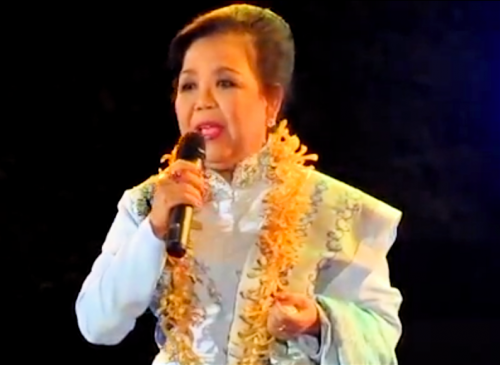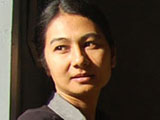Mar Mar Aye: The Power of One Voice
by Khet Mar / February 7, 2013 / No comments
Although Burmese singer Mar Mar Aye was in exile for 15 years, she never stopped supporting her people.

Mar Mar Aye performs at the People's Square Park, in Yangon, on January 12, 2013. Photo: Myanmar Celebrity, YouTube.
If I said that Mar Mar Aye is a brilliant singer and a treasure for Burma, there would be few who would argue with me. And, whether living in her home country or the United States, she has tirelessly supported the Burmese people through her music.

- In Burma if you want to hear about issues the newspapers can’t talk about, you should go to a tea shop. Tea houses were where I used to meet with other activists, writers and artists, as well as where I built friendships. Within tea houses we talked about Burmese writers, literary trends we noticed, and, of course, politics. This online space attempts to emulate the conversations I enjoyed in Rangoon’s tea houses.

- Khet Mar is a journalist, novelist, short story writer, poet, and essayist from Burma. She is the author of one novel, Wild Snowy Night, as well as several collections of short stories, essays and poems. Her work has been translated into English and Japanese, been broadcast on radio, and made into a film. She is a former writer-in-residence at City of Asylum/Pittsburgh.
Mar Mar Aye started singing when she was eight and made her second album, Let’s Play on the Rainbow, which was a national breakthrough, at the age of thirteen. In her prolific career she has written two novels, founded a singing academy, and run a music publication house and recording studio. She also worked for Burma’s Broadcasting Service for 16 years and became a member of the National Music Council. Since 2003 she has worked on a BBC weekly radio program entitled “I Still Have So Much to Tell You.”
But back in 1998 Mar Mar Aye reached a turning point in her life: In that year she emigrated to the United States. Because she left Burma, she wasn’t allowed to release her albums and her songs were banned on the radio; even her name couldn’t be mentioned in books without a reason. Consequently, people who were born in Burma after 1998 never heard her name, nor her songs.
Of course, this did not stop her from being a politically active artist. While in the States Mar Mar Aye composed songs supporting the Saffron Revolution and the victims of 2008’s Cyclone Nargis, who didn’t receive proper aid from Burma’s military government.
Despite being transplanted from her home, it was clear that Mar Mar Aye’s soul was still with the Burmese people. In a radio interview in 2008 she said, “Although I have been living out of my country for over a decade, I feel what my people feel because my soul and my sympathy are there with them.”
While I didn’t have a chance to meet Mar Mar Aye in Burma, I got to know her in 2010 at a literature talk in Fort Wayne, Indiana, where she had been living. It was here that I saw her as a community head who has continually led and helped the Burmese community from afar.
“There are a lot of beautiful places in our country, like here in America,” she said in a television interview last year. “I think it would be great if our people could enjoy these beautiful places with peaceful and joyous lives.”
In my second visit to Fort Wayne, I told Mar Mar Aye that her longtime friend and fellow singer, Ko Tin Hlaing, had cried when he talked about her, saying, “My sister Aye, we miss you very much!” Even before I finished this story Mar Mar Aye was crying and, wiping her tears with one hand, said, “I don’t know when I will get to see my friends like him again…”
I will never forget that image.
But in early January, something that Mar Mar Aye never thought could happen took place. At 70 years old, she returned to Burma. After 15 years in exile she finally experienced the long-awaited reunion with her friends and audience when she performed a solo outdoor concert in Yangon. Despite the cold weather her audience stayed for most of the show, excited to hear her music again.
In a perfect world, Mar Mar Aye, who loves traditional Burmese music, would return to Burma permanently so she could be with an audience that loves her music. But, due to medical and financial issues, she cannot go back.
“I am not the old Mar Mar Aye,” she said. “I had heart bypass surgery; I am like a re-born Mar Mar Aye. I’m on a lot of medication and if I live in Burma, how can I have money for my medical needs? I have Medicare in America. In Burma, I couldn’t make any money for over a decade because my albums, my songs, and even my name were banned.”
How long will we ignore the refugees who wish to be back in their own country, like Mar Mar Aye? It’s a tragedy that she has been banned from her home, and cannot go back to her friends and family.




